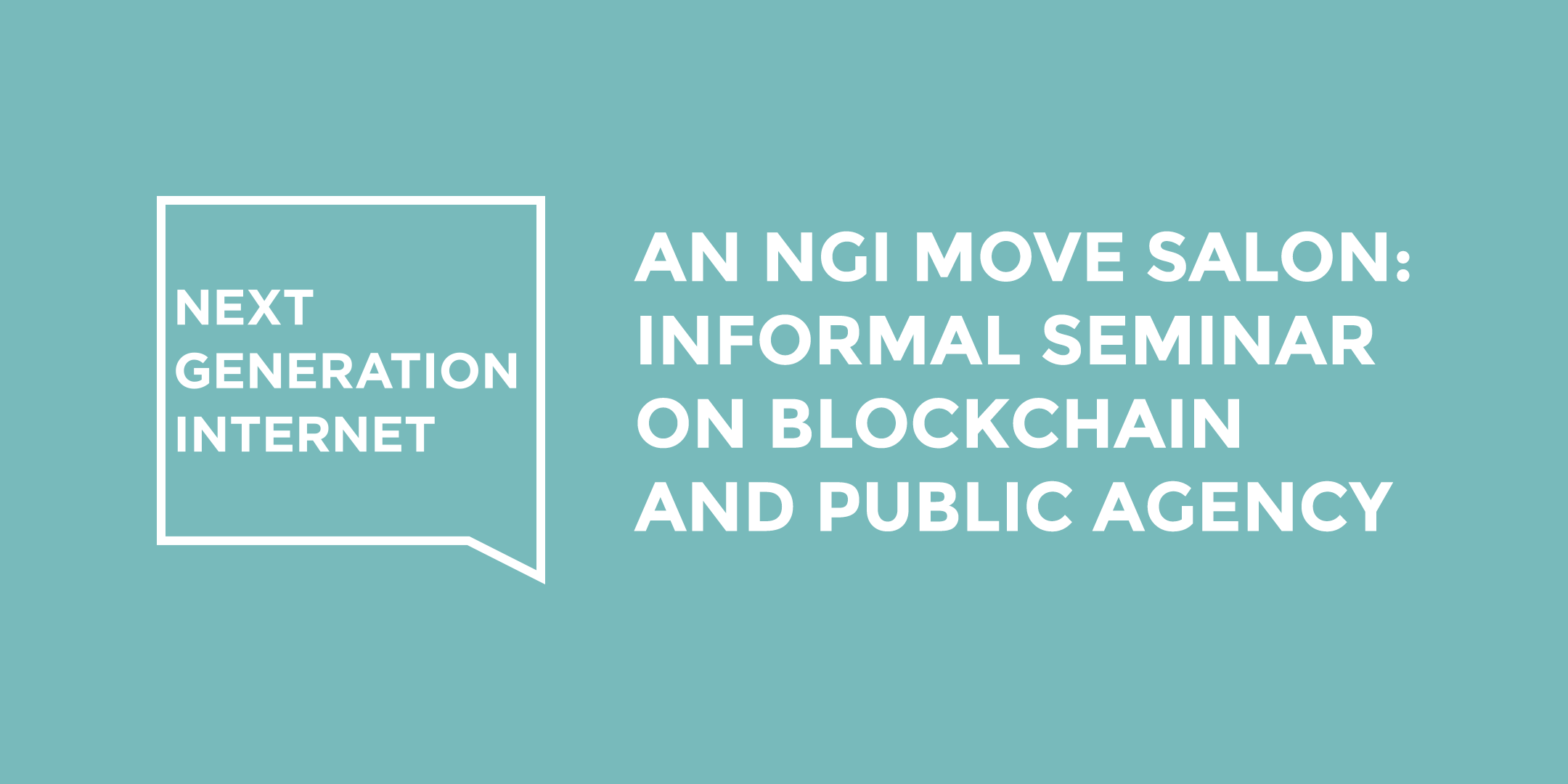
- This event has passed.
An NGI Move Salon: Informal Seminar on blockchain and public agency

An NGI Brussels: on blockchain and public agency
On blockchain and public agency.
Decentralized data governance: leveraging on distributed open hardware and software ecosystems based on blockchains, distributed ledger technology, open data and peer-to-peer technologies. Attention should be paid to ethical, legal and privacy issues, as well as to the concepts of autonomy, data sovereignty and ownership, values and regulations.
In Smart Decentralisation: Moving From The Cloud To The Fog, Dominik Schiener, Co-Founder — IOTA Foundation, asks what the evolutionary transition towards smart decentralization means for both the internet of things and our society?: “With the introduction of blockchain, the internet of things will actually move away from the cloud and towards the fog – something that in turn could give rise to a fully autonomous machine economy, one that no longer needs the intervention of human managers.” DECODE provides tools that put individuals in control of whether they keep their personal data private or share it for the public good. IDEO, Microsoft, IOTA support DIF in building an open source decentralized identity ecosystem for people, organizations, apps, and devices. The goal of the World Identity Network (WIN) is to catalyze progress towards universal ID and robust, secure, digital identification systems using 21st century technology solutions, such as the distributed ledger technology (DLT). uPort is an open source software project to establish a global, unified, sovereign identity system for people, businesses, organizations, devices, and bots. Accenture and Microsoft are creating a blockchain solution to support ID2020, a global public-private partnership dedicated to solving the challenges of identity faced by more than 1.1 billion people around the world. What will this competition on the passport lead to? What kind of societies are being built by whom?
Venue
DIGITALEUROPE
14 Rue de la Science,
1040 Brussels, Belgium
Moderators
Gérald Santucci (writer) and Cecilia Bonefeld-Dahl, DG DIGITALEUROPE
Rapporteur
Rob van Kranenburg (Resonance Design)
Agenda
- NGI Welcome by Nicole Müssigmann, Policy Officer EC
- Opening remarks by Eva Kaili, Member of the European Parliament #Chair Scientific Foresight Unit & Chair D-NATO PA EU
- Panel with:
- Andrea Servida, Head of Unit “eGovernment and Trust” DG CONNECT
- Denis ‘Jaromil’ Roio, CTO and co-founder of Dyne.org Foundation, lead design of DECODE
- Dominik Schiener, Working on the intersection of IoT and Blockchain. Co-Founder @iotatoken
- Susana Nascimento, Policy Analyst-Foresight, Behavioural Insights and Design for Policy, JRC
- Fabrizio Sestini, Senior Expert for Digital Social Innovation, DG CONNECT
- Marloes Plomp, Member of the Advisory Board bij bitJob, presenting Blockchain Pilots
The event is FREE but RSVP to kranenbu@xs4all.nl (max 30)
Be up to date! Follow @NGI4EU | #NGI4EU #NGIeu
NGI – Towards a future Internet that better responds to the expectations of the citizens!
„We need the collective vision and engagement of all stakeholders to create the Next Generation Internet. We need to gather and discuss ideas concerning concepts, technologies and applications coming from the largest possible community. We need to work together to build a future Internet that better responds to the expectations of the citizens.“
Roberto Viola, Director-General for Communications Networks, Content & Technology at the European Commission
NGI Move, @NGI4EU brings you Salons and Meetings all over Europe to promote, exchange and debate the Next Generation Internet movement.
What should the Next Generation Internet look like?
Join the NGI-Movement @NGI4EU
NEXT GENERATION INTERNET FUNDING
For the ICT-24 call closing in 2018, ‘Research & Innovation Actions’ in the following three sub-topics will be called for. Proposals should address only one of these sub-topics. Specifically, the call is designed for 20/80% funding scheme, where 80% is reserved for sub-granting.
Privacy and trust enhancing technologies: as sensors, objects, devices, AI-based algorithms, etc., are incorporated in our digital environment, develop robust and easy to use technologies to help users increase trust and achieve greater control when sharing their personal data, attributes and information.
Decentralized data governance: leveraging on distributed open hardware and software ecosystems based on blockchains, distributed ledger technology, open data and peer-to-peer technologies. Attention should be paid to ethical, legal and privacy issues, as well as to the concepts of autonomy, data sovereignty and ownership, values and regulations.
Discovery and identification technologies: to search and access large heterogeneous data sources, services, objects and sensors, devices, multi-media content, etc. and which may include aspects of numbering; providing contextual querying, personalized information retrieval and increased quality of experience.


